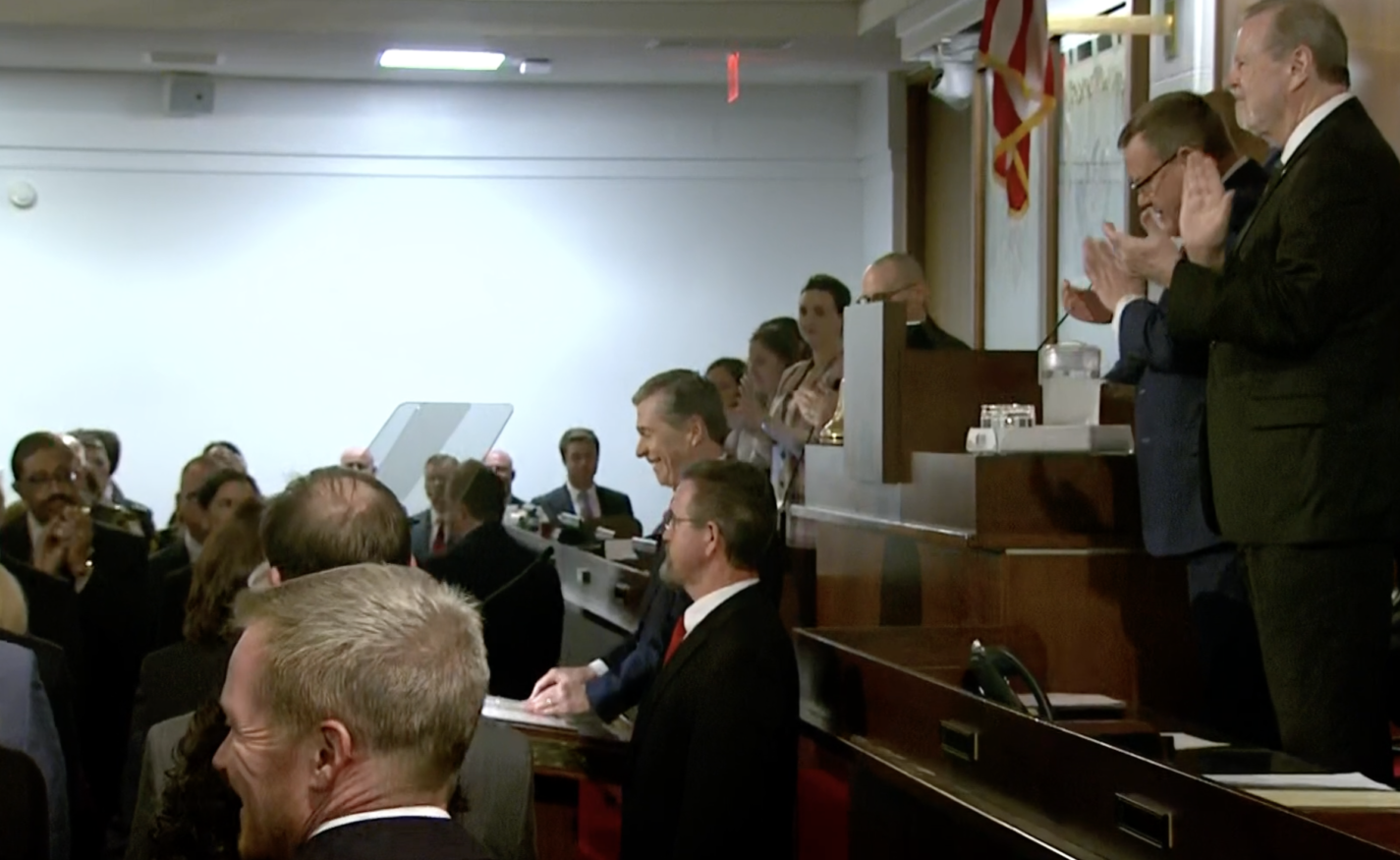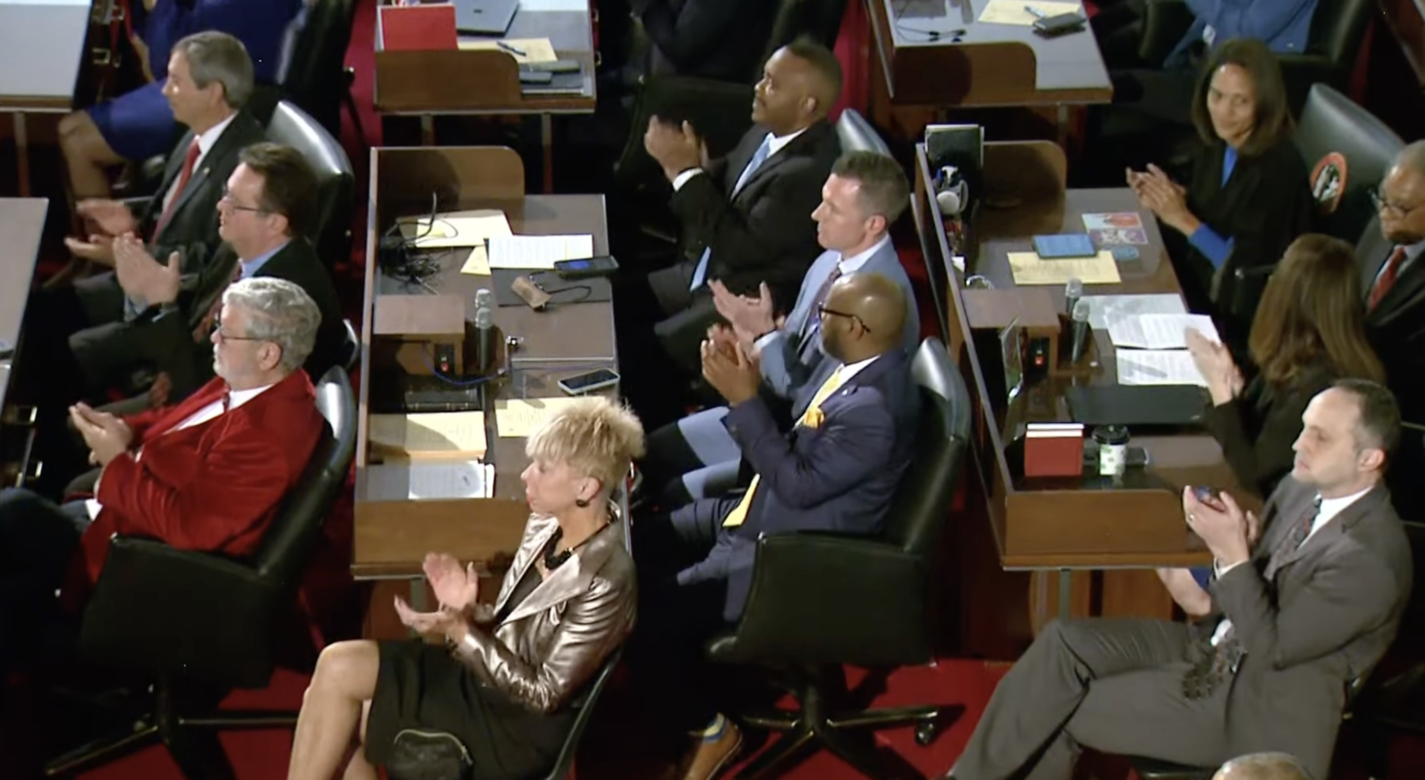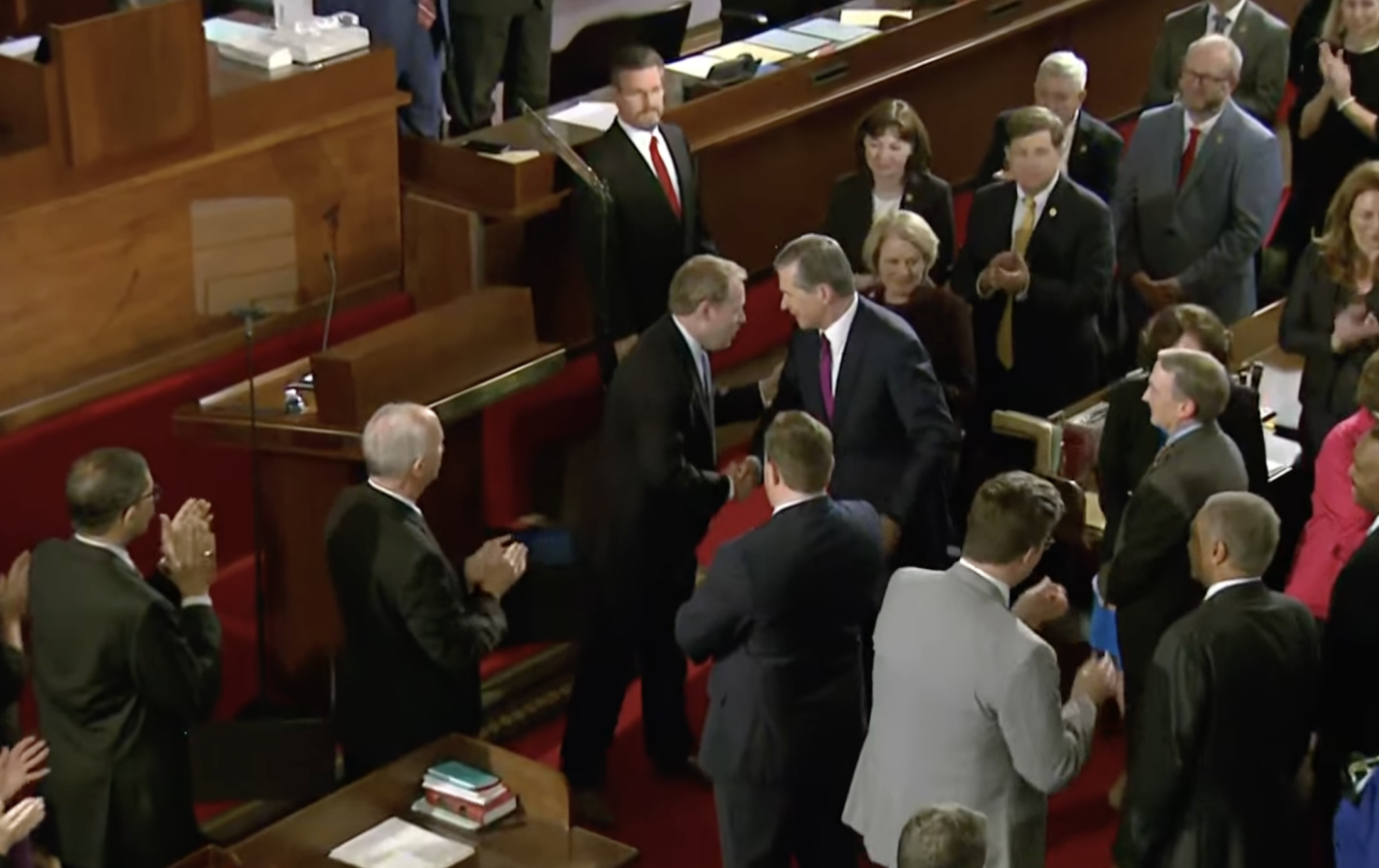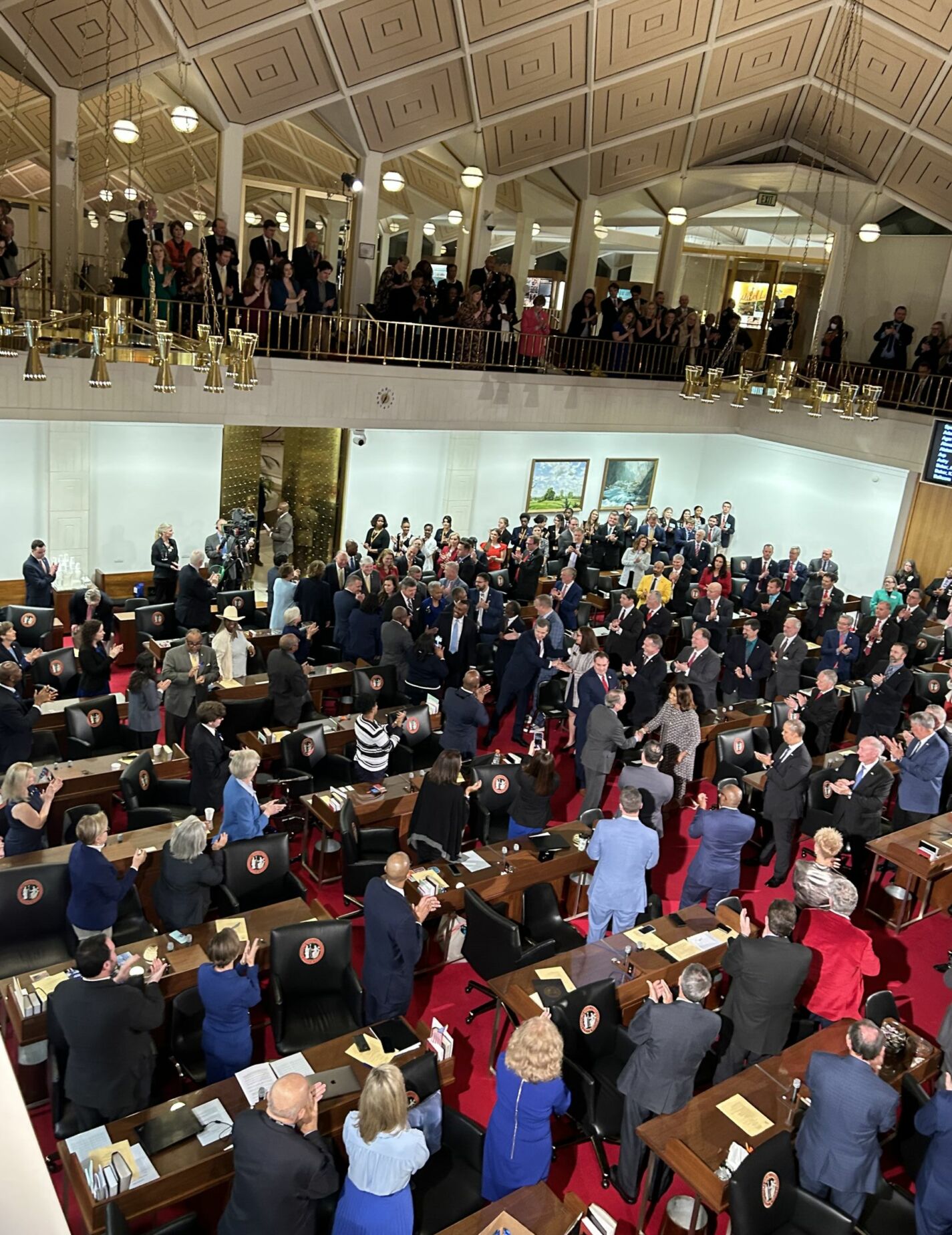North Carolina Democrat Gov. Roy Cooper gave his fourth and final State of the State address Monday night to what appeared to be, at times, a divided room between Democrats and Republicans. Lt. Gov. Mark Robinson presided over the joint session of the legislature hosting Cooper, and delivered a pre-taped Republican response after.
After a recent move by Republicans to agree to expanding the Medicaid entitlement program, Cooper peppered the speech with calls to change how they pass the expansion, funding the Leandro plan, and to not “move backward” urging the General Assembly “to keep us off the front lines of those culture wars that hurt people and cost us jobs.”
He began his speech by referencing that North Carolina chartered the first public university system in the country 234 years ago, cited the creation of the Research Triangle Park 60 years ago and the North Carolina Biotechnology Center 39 years ago.
“Time and again, overcoming adversity, our leaders had the foresight and the resolve to invest in new ideas that have revolutionized our state, impacting the generations that follow, and while we stand on their shoulders, we also stand at an altogether new crossroads,” Cooper said. “One that demands that we have the same clarity of purpose, the same innovation, the same determination that brought us here. Our moment to build enduring prosperity is now and I know that North Carolina is ready.”
He segued into how North Carolina is becoming a leader in the global clean energy economy, bringing good-paying manufacturing jobs to parts of the state, and that electric vehicles are projected to grow into a $400 billion global market in five years. Cooper cited battery manufacturing in Randolph County, semiconductor production and electric vehicle manufacturing in Chatham County, and charging station production in Durham County that is already taking place.
He finished his talking points on clean energy by noting that North Carolina was the second state in the Southeast to put carbon reduction requirements into law through bipartisan cooperation in the General Assembly, referring to the H.B. 951 law to enact Cooper’s executive order that the state be carbon neutral by 2050.
Cooper touted his administration’s focus on moving the state to a net zero carbon future with clean transportation and renewable energy like wind and solar.
Cooper did receive applause from both sides of the aisle when he mentioned that the state broke records in 2022 with tens of thousands of new jobs and that North Carolina was named the number one state in the country for business.
Education
Education was next on his agenda, including how the state was able to invest more than $800 million in the early childhood care centers from money the state received from the American Rescue Plan.
Cooper took a swipe at Republican legislators over a judge’s order to bypass the state legislature and direct the treasury to release millions of state dollars to fund the 2018 Leandro Comprehensive Remedial Education Plan. The previous left-leaning N.C. Supreme Court upheld that judge’s order, but last week the new court, which became right-leaning after the November elections, reinstated a lower court’s order blocking the transfer of funds.
“The court should uphold decades of bipartisan Supreme Court precedent that comes down on the side of the children because that’s what really matters,” Cooper said.
Cooper said the state has the money this year and next to fund the Leandro plan, developed by a California-based private consulting group. In N.C., a budget proposal presented by the governor outlines his spending priorities. The state legislature sets the budget every two years, with updates on alternate years, and sends it to the governor for signature. Cooper signed the legislature’s biennium budget in 2022, after vetoing them since taking office in 2016.
“The budget I will present to you invests in the entire education plan ordered by the court,” he said. He said his budget proposal would also give teachers and principals double-digit raises.





Gov. Roy Cooper delivered North Carolina’s State of the State address to a joint session of the North Carolina General Assembly. March 6, 2023. Source: Carolina Journal
Cooper said that while he has already directed tens of millions of federal funding into funding for mental health aid in schools, he said in the coming days, he will propose a plan that makes historic investments in the “whole person health” of every North Carolinian.
He wrapped up his points on education by highlighting the importance of colleges and universities, including community colleges, HBCU’s, and the creation of the Bipartisan Commission on the Future of Public Universities.
spending
He took another jab at the Republican-led General Assembly for proposing further tax cuts, citing that the North Carolina Chamber of Commerce has said the current corporate tax rates are already competitive. Cooper signed the November 2021 budget, which gradually reduces the corporate tax rate, if the state economy is strong, until it is eliminated in 2030.
Cooper promised that as part of the American Rescue Plan, every home in North Carolina would have access to high-speed internet.
Continuing to tout the federal money from the Biden Administration through the federal infrastructure bill and American Rescue Plan, Cooper said the state plans on investing $2.3 billion over the next two years for infrastructure needs, including nearly $500,000 for water infrastructure upgrades.
medicaid expansion
The room became clearly divided when Cooper brought up Medicaid expansion. Democrats loudly cheered, clapped, and stood up, while many Republicans remained stoic and seated, despite a majority of Republicans in the state legislature agreeing to expand the federal Medicaid entitlement program in N.C.
Cooper pushed to pass Medicaid expansion as a stand-alone measure rather than writing it into the state budget, as Republicans have proposed, so it would take effect sooner than the likely summer passage of the budget. He said waiting to expand could cost lives and more than $521 million a month in federal healthcare dollars. He also said that putting it in the budget could risk the additional $1.8 billion in federal money that the Biden Administration is using to incentivize the 11 states that have not expanded Medicaid, called Healthcare Access and Stabilization, or HASP, funds.
“Finally, we all now agree on Medicaid expansion,” Cooper said. “We all now agree on how to do it, and we all now agree on what other healthcare laws will be changed with it, for mental health, for working families, for rural hospitals, for a healthier North Carolina. It’s $1.8 billion that we cannot afford to leave behind. Let’s expand now.”
He also talked about investing resources to recruit and retain law enforcement officers and called to fight gun violence, citing the recent release of the Child Fatality Task Force annual report that said children in North Carolina were 51% more likely to die from gun violence than the average of children in the U.S. The same report found that the suicide rate among N.C. teens has nearly tripled in the last 20 years.
Cooper briefly mentioned that there is still work to do for those like hurricane survivors who may “feel forgotten and left behind,” referring to problems in his N.C. Office of Recovery and Resiliency, as some victims of Hurricanes Matthew and Florence remain in hotels years later, but said he is encouraged by the progress that has been made as a state.
As he wrapped up his address, Cooper referred to the Parent’s Bill of Rights and abortion policy.
“Use the public schools to build a brighter future, not to bully and marginalize LGBTQ students,” Cooper said. “Don’t make teachers rewrite history. Keep the freedom to vote and reach for every eligible voter. Leave the decisions about reproductive health care to women and their doctors.”
Cooper said he and legislators had found plenty to disagree about over the years but have found areas of common ground that they should build upon.
“I stand before you to report that the state of our state is bright and energized with the promise of tomorrow,” he said.